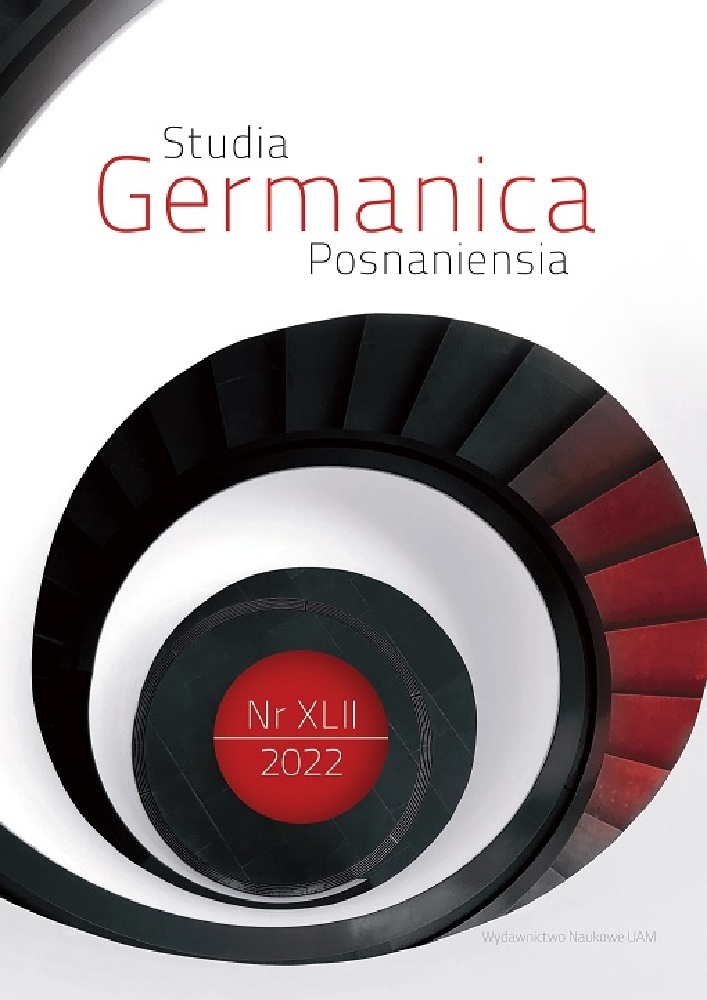Abstrakt
Der Aufsatz untersucht zwei Beispiele aus dem deutschsprachigen Gegenwartstheater im Hinblick auf Ästhetiken des Posthumanen. Obwohl das Theater von und für Menschen gemacht ist, wird argumentiert und nachgewiesen, dass beide Beispiele eine historische Konfiguration von Menschen und Menschlichkeit befragen und schließlich negieren. In Marta Górnicka’s Still Life (2021 Maxim-Gorki-Theater, Berlin) und Anta Helena Recke’s Die Kränkungen der Menschheit (2019 Münchner Kammerspiele, München) wird die Frage nach dem Menschlichen verschiedentlich, aber ästhetisch ähnlich – nämlich mit einem vielstimmigen Chor – verhandelt. Während in Gornicka’s Inszenierung eine Anklage der westlichen, eurozentrischen Menschlichkeit und dessen gewaltvollen Ausschlusspraktiken aufgezeigt wird, vollführt die Inszenierung von Recke eine – wenn nicht gar die – Kränkung an einem eurozentrisch geprägten Begriff vom Menschen durch einen selbstverständlichen Auftritt eines Chores von Women of Color, der nicht an westliche ästhetische Normen und deren epistemische Verankerung gebunden ist. Beide Inszenierungen verwenden ästhetische Strategien, die Welten „nach“ der eurozentrischen Figuration des Menschen einfordern und daher zu „Ästhetiken des Posthumanen“ gezählt werden können.
Bibliografia
Die Kränkungen der Menschheit. Regie: Anta Helena Recke. Premiere am 26. September 2019, Münchner Kammerspiele.
Still Life. A Chorus for Animals, People and All Other Lives. Regie und Libretto: Marta Górnicka. Premiere am 31. Juli 2021, Maxim Gorki Theater Berlin.
Ahmed, S. (2008). Open Forum Imaginary Prohibitions: Some Preliminary Remarks on the Founding Gestures of the `New Materialism’. European Journal of Women’s Studies, 15 (1), 23-39. DOI: https://doi.org/10.1177/1350506807084854
Barad, K. (2003). Posthumanist Performativity: Toward an Understanding of How Matter Comes to Matter. Gender and Science: New Issues (Spring 2003), 28(3), 801-831. DOI: https://doi.org/10.1086/345321
Barad, K. (2007). Meeting the Universe Halfway: Quantum Physics and the Entanglement of Matter and Meaning. Durham; London: Duke University Press. DOI: https://doi.org/10.2307/j.ctv12101zq
Barad, K. (2012). Agentieller Realismus. Berlin: Suhrkamp.
Bennett, J. (2010). Vibrant Matter. A Politcal Ecology of Things. Durham; London: Duke University Press. DOI: https://doi.org/10.1215/9780822391623
Bennett, T. (2010). Der bürgerliche Blick. Das Museum und die Organisation des Sehens. In D. v. Hantelmann & C. Meister (Hrsg.), Die Ausstellung. Politik eines Rituals (S. 47-78). Zürich, Berlin: diaphanes.
Braidotti, R. (2019). Posthuman Knowledge. Cambridge, Melford: Politiy Press.
Césaire, A. (2000). Discourse on Colonialism. New York: Monthly Review Press.
Czepel, R. (2021). Darwins rassistische Thesen. Abgerufen von https://science.orf.at/stories/3206682/.
da Silva, D.F. (2015). Before Man: Sylvia Wynter’s Rewriting of the Modern Episteme. In Sylvia Wynter: On Being Human as Praxis (S. 90-105). Durham, London: Duke University Press. DOI: https://doi.org/10.2307/j.ctv11cw0rj.6
Ferrando, F. (2019). Philosophical Posthumanism. London, New York: Bloomsbury Academic. DOI: https://doi.org/10.5040/9781350059511
Freud, S. (1917). Eine Schwierigkeit der Psychoanalyse. Imago. Zeitschrift für Anwendung der Psychoanalyse auf die Geisteswissenschaften V, 1-7.
Gordon, A. (2008). Ghostly Matters. Haunting and the Sociological Imagination. Minneapolis: University of Minnesota Press.
Górnicka, M. (2022). Marta Górnicka: Still Life. Abgerufen von https://gornicka.com/projects/still-life-achorus-for-animals-people-and-all-other-lives/.
Grusin, R. (2015). Introduction. In R. Grusin, The Nonhuman Turn (S. vii-xxix). Minneapolis, London: University of Minnesota Press.
Hartman, S. (2019). Wayward Lives, Beautiful Experiments: Intimate Histories of Riotous Black Girls, Troublesome Women, and Queer Radicals. New York, London: W.W. Norton & Company.
Hass, U. (2021). Kraftfeld Chor Aischylos Sophokles Kleist Beckett Jelinek. Berlin: Theater der Zeit.
Hollinger, V. (2020). Historicizing Posthumanism. In S. Vint (Hrsg.), After the Human. Culture, Theory and Criticism in the 21st Century (S. 15-30). Cambridge, New York: Cambridge University Press. DOI: https://doi.org/10.1017/9781108874427.002
Jackson, M. (2018). Introduction. A critical bridging exercise. In M. Jackson, Coloniality, Ontology, and the Question of the Posthuman (S. 1-18). London, New York: Routledge. DOI: https://doi.org/10.4324/9781315686721-1
Jackson, Z.I. (2013). Review: Animal: New Directions in the Theorization of Race and Posthumanism. Feminist Studies, 39 (3), Feminist Studies, Inc., 669-685. DOI: https://doi.org/10.1353/fem.2013.0024
Jackson, Z.I. (2020). Becoming Human. Matter and Meaning in an Antiblack World. New York: New York University Press. DOI: https://doi.org/10.18574/nyu/9781479890040.001.0001
Kaiser, B.M., & Thiele, K. (2018). Returning the Question of the Human: An Introduction. philoSOPHIA: A Journal of Continental Feminism, 8 (1), 1-17. DOI: https://doi.org/10.1353/phi.2018.0000
Ranisch, R., & Sorgner, S.L. (2014). Introducing Post- and Transhumanism. In R. Ranisch, & S.L. Sorgner, Post- and Transhumanism: An Introduction. (S. 7-27). Frankfurt a. M.: Peter Lang. DOI: https://doi.org/10.3726/978-3-653-05076-9
Ruhsam, M. (2021). Moving Matter: Nicht-menschliche Körper in zeitgenössischen Choreografien. Bielefeld: transcript. DOI: https://doi.org/10.1515/9783839458563
Schoer, N. (2019). Vom bürgerlichen Blick zum posthumanen Schnitt. Kuratorische Praxis im Kontext medientechnologischer
Entwicklungen. Abgerufen von http://zkmb.de/vom-buergerlichen-blick-zum-posthumanen-schnitt-kuratorische-praxis-im-kontext-medientechnologischer-entwicklungen/.
Sharifi, A. (2020). Die Umkehrung des kolonialen Blicks. Abgerufen von https://www.goethe.de/ins/br/de/kul/mag/21822098.html.
Singh, J. (2017). Unthinking Mastery. Dehumanism and Decolonial Entanglements. Durham: Duke University Press.
Varela, M. d., & Dhawan, N. (2015). Postkoloniale Theorie. Eine kritische Einführung. Bielefeld: transcript.
Weheliye, A. (2002). “Feenin” Posthuman Voices in Contemporary Black Popular Music. Social Text, 71, 20 (2), 21-47. DOI: https://doi.org/10.1215/01642472-20-2_71-21
Wynter, S. (1995). 1492: A New World View. In V.L. Hyatt & R. Nettleford, Race, Discourse, And the Origin of the Americas. A New World View (S. 5-57). Washington, London: Smithsonian Institution Press.
Wynter, S. (2003). Unsettling the Coloniality of Being/Power/Truth/Freedom: Towards the Human, After Man, Its Overrepresentation – An Argument. CR: The New Centennial Review, 3 (3), 257-337. DOI: https://doi.org/10.1353/ncr.2004.0015
Yusoff, K. (2018). A Billion Black Anthropocenes or None. Minneapolis: University of Minnesota Press. DOI: https://doi.org/10.5749/9781452962054
Licencja
Prawa autorskie (c) 2022 Karina Rocktäschel

Utwór dostępny jest na licencji Creative Commons Uznanie autorstwa – Bez utworów zależnych 4.0 Międzynarodowe.
